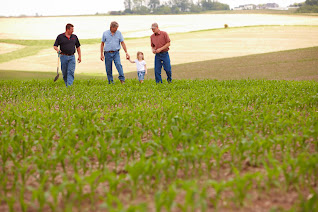This essay is a merit winner in the 2022 Ag Day Essay Contest. Visit www.agday.org for more details on National Ag Day.
Makenna Stundebeck
Salisbury, Missouri
Howard Buffett said, “The challenge is clear; we
have to conserve and improve the soil we have, and we need to turn dirt into
soil wherever people need to grow food” (Buffett). The question is, is there a
compromise between increasing the bottom line and being good stewards of the land?
Farmers have the daunting task of keeping their farms afloat, while maintaining
a stable, and healthy environment for future generations. As farmers and
innovative thinkers in the agriculture industry, it is our responsibility to be
constantly researching methods to preserve the Earth while providing for the
ever-growing population. Whether it is through cover crops, the usage of buffer
zones, or by reducing chemical application, farmers must always take into
account tactics to preserve the Earth’s soil, water, and air.
No one is closer to the land than a farmer. The
livelihoods of farmers depend on their ability to use the land, therefore, it
is in the farmer’s best interest to help protect the land because they rely on
it. One way that farmers protect the Earth’s soil is through cover crops. Cover
crops are grown to protect and enrich the soil and make sure that the soil is
healthy by putting nutrients back into it. The use of cover crops has also been
shown to increase crop yields, therefore, farmers can grow more food and feed
more people.
Farmers are also proactive gatekeepers of the
earth’s water resources, through the usage of buffer zones. With buffer zones,
farmers plant strips of vegetation between fields and bodies of water, such as
streams and lakes. These plants keep soil in place, and soil out of the water
source. Buffer zones also act as a filter for water that flows from the field
to the waterway. This is important because clean water is a necessity for
farmers, their land and families.
Lastly, farmers are positive stewards of the air.
Farmers breathe the same air that is around their crops, so they are mindful
about chemicals they spray. Many farmers conduct soil tests on their land so
that they are only applying the amount of nutrients needed for what they are
planning to grow. This requires farmers to constantly regulate chemical usage,
which allows them to be aware of the chemicals they spray on crops to ensure toxins
are not released into the air.
Agriculture is an industry that is at the root of the
American Enterprise system. It is an industry that continues to evolve and
grow, because feeding the world is not a job that will become obsolete. Farmers
are stewards of the soil, water, and air, and continuously work to preserve the
land for future generations.


